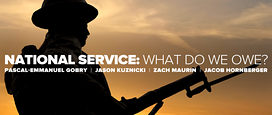Earlier I asked Zach Maurin to name the market failure that would justify his proposed new federal program, namely one year of funding (at some unspecified salary level, which is not a negligible consideration!) for all who those who wished to work at a nonprofit.
It would have to be a pretty remarkable market failure if it just so happened to have such a precise, tidy little solution: Somehow Maurin would have to argue that the market for labor in the nonprofit sector was continuously failing to clear by exactly this much: In good economic times and in bad, through terrible tragedies and also through ordinary life, he’d have to say that there was always just this much value being left on the table.
I knew it was very unlikely that he could do this. Personally, I can’t even make up a market failure with those characteristics. And, in his most recent piece, Maurin appears not to have tried. Instead, he writes about how volunteers do good work.
That’s nice, and I certainly believe it, but it’s not what I’m looking for. It surely is a good work to “mentor struggling students so they pass their classes, help families rebuild after floods, and work with the elderly to live independently.” I hope that many will continue to do exactly these things. I also hope that our economy will grow vigorously, giving many more the resources to care not just for themselves and their families, but for a wider and wider community. That would be wonderful.
But I do not agree that adding one year of paid labor for all who desire it will solve all our various social ills the most efficiently, given the resources otherwise at hand. That’s not solving a market failure. That’s magical thinking.
The fact that we can imagine a person doing good does not mean that we should ask the government to pay for him. When we reach for the government, we must remember to think both of what is seen and of what is unseen. Politicians tend to prefer the seen, and it’s very rare indeed that they even think about the unseen. But economic actions always have effects of both types.
In Maurin’s most recent essay, and indeed in his earlier piece, he neglects to mention the unseen costs of volunteer work. In a way I can’t blame him. Such costs are impossible to calculate. But as I alluded to earlier, it would be startling to tamper so crudely with a labor market and produce no significant negative effects. It is also very unclear that nonprofit work is precisely where all these people can do the most good for society — but only for one additional year. To make that argument, you’d need a coherent theory of a market failure, which we still don’t have.
And then there is the deadweight cost of taxation: Workers’ salaries have to be paid for with taxes, either now or in the future, and the deadweight loss that results is a good reason all by itself to keep tax rates low.
Now I’m going to take off my economist hat, which I only wear when I must. It simply is not true that allowing individuals to choose their nonprofit activities makes Maurin’s program voluntary. It is no such thing. Taxpayer money comes from taxpayers, after all, and taxation is not voluntary. Maurin is thus wrong when he writes:
In Hornberger’s latest piece he talks about the voluntary donations to one’s church. There’s a request, but no expectation to give, and no consequence if you don’t. That’s exactly how national service works and what I’m advocating for. Political leaders, community leaders, church leaders, teachers, parents, and friends should ask – not require – young people to serve a year to their community to help others.
Maurin would not request that anyone give their money. He would command them, through the power of the Internal Revenue Service. That’s a power that churches do not have — thank goodness — and one I do not think his program should have either.

